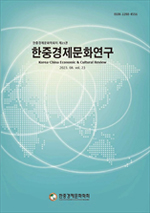학술논문
An Empirical Analysis of the Impact of RMB Exchange Rate Changes on Sino-Korea Trade: The Case of Auto Industry
이용수 0
- 영문명
- An Empirical Analysis of the Impact of RMB Exchange Rate Changes on Sino-Korea Trade: The Case of Auto Industry
- 발행기관
- 한중경제문화학회
- 저자명
- Yang, Hailan Hu, Ning Shi, Xiangjiao
- 간행물 정보
- 『한중경제문화연구』제15권, 123~140쪽, 전체 18쪽
- 주제분류
- 경제경영 > 경제학
- 파일형태
- 발행일자
- 2020.08.31

국문 초록
영문 초록
Purpose - This paper empirically investigates the role of volatility in the China’s Renminbi (RMB) exchange rate plays on the Sino-Korea trade based on the analysis of auto industry. Due to the increasing proportion of China’s share in the world trade, RMB exchange rate is getting attention worldwide. Due to the close Sino-Korea trade relationships and the special position that auto industry plays in a country’s economy, this paper examines the causal relationship between RMB exchange rate volatility and Sino-Korea trade in this sector. Design/Methodology - Econometric methods including Johansen test of Co-integration, Granger causality analysis and multiple regression analysis are employed to explore the impact of RMB exchange rate changes on Sino-Korea bilateral trade flow using time series data of from 2001 to 2017. Findings – The outcome shows the real exchange rate changes of RMB have a limited effect on the improvement of Sino-Korea trade. The result indicates that there is a steady long-term relationship between bilateral real exchange rate of RMB and Sino-Korea trade. However, since the elasticity of exchange rate is too small, the change of exchange rate has a limited influence on Sino-Korea trade. In a short-run there is no lag on Sino-Korea trade processed by the real exchange rate. Originality/value - Neither theoretical studies nor argument analysis have reached a common conclusion on this point in the extant research. Even for the same country, the difference of industry, data and model they selected could result in the different results. Thus, this study is re-assessing the RMB’s exchange rate changes and Sino-Korea trade relationship by using the most recent and industry-level trade data. To examine the relationship this paper focuses on auto industry, the representative of the manufacturing industry in both countries.
목차
Ⅰ. Introduction
Ⅱ. Theoretical basis and literature review
Ⅲ. The Evolution of Sino-Korea Trade Relations
Ⅳ. The Models and Methods
Ⅴ. Conclusions
해당간행물 수록 논문
참고문헌
최근 이용한 논문
교보eBook 첫 방문을 환영 합니다!

신규가입 혜택 지급이 완료 되었습니다.
바로 사용 가능한 교보e캐시 1,000원 (유효기간 7일)
지금 바로 교보eBook의 다양한 콘텐츠를 이용해 보세요!



